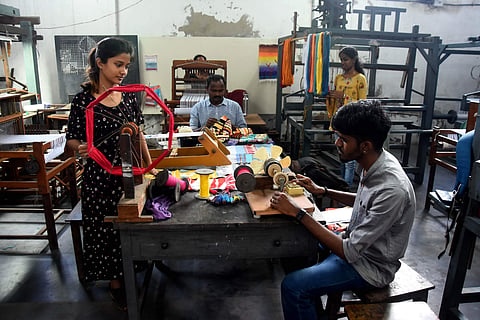

According to a Dell report, 85% of the jobs in 2030 that Generation Z and Alpha would embrace have not been invented yet. In addition, as per a World Economic Forum report, 65% of primary-school children today will be working in job types that do not exist yet.
These reports collectively raise the question as to how education needs to change to be able to better prepare our young learners for what the future might hold.
The Human Development Report 2020 released by the United Nations Development Programme (UNDP) ranks India at the 129th spot among the 162 nations listed in the skilled labour force category with a score of 21.2%, which translates to one in five Indians. The above observation could be attributed to the advent of automation that would lead to new job profiles prospectively. The Indian education system has arrived at a crossroads, encountering skill deficiency on one hand and the need for repurposing skills for the future, on the other hand.
Do we have the scope to promote education from mere acquisition of knowledge to skills?
Reportedly, we are producing over three million first-degree holders annually and less than 20% of these are employable! The problem is that these graduates have neither skill set nor any disciplinary depth. Therefore, they are ill-equipped for crafting a meaningful career. This is a colossal waste.
What do companies look for while employing undergraduates and postgraduates from the Science discipline is a significant question one has to peep into while contemplating on education. The present status of undergraduates in Science is that they complete the course successfully but lack potential employability. Even if they wish to pursue higher education in the same branch, proficiency beyond the so-called conventional academic excellence is under crisis.
Thus, after exhausting three years of undergraduation or five years of postgraduation, life becomes meaningless. The present Indian education scenario could be defined along the lines of skills than mere acquisition of knowledge so as to empower the graduates to face the world boldly with certainty.
The government of Tamil Nadu has come up with a wonderful scheme known as Naan Mudhalvan, to create a skilled workforce by integrating it with the curriculum. Through this scheme, the government is going to equip 10 lakh youngsters across the state annually with skills which will help them realise their talents for the benefit of the country.
Although the Government of India has established National Skill Development Corporation (NSDC) with a proper skill qualification framework, realising a skilled workforce that would contribute to the economic development of the country is still a challenge to be accomplished.
‘Thinkers’ and ‘tinkerers’ as sources of value creation
Thinkers and Tinkerers are two streams of people who are needed to contribute to the development of a nation. Thinkers would evolve as thought leaders creating value and tinkerers would serve as a skilled workforce to execute the ideas of value creation by thought leaders. The balance between these two must hold the economy of the country.
Owing to automation and a lack of repurposing the skilled workforce towards cutting-edge technology has brought down the skilled labour force, thus, reflected in the human development report.
How do we perceive the role of specific skills in the future of education?
A study by Oxford University states that 20 years from now, nearly half of the jobs will be automated and we are in need to redefine our educational system keeping in mind the challenges ahead. Value has shifted its basis from cognitive skills to social skills as stated by Greg Satell, author of Mapping Innovation. Rather than knowledge and intelligence, the ability to collaborate will be the defining competitive attribute in the future of education.
This new era will not be solely human-driven or machine-driven, but a collaboration between humans and machines. Education has never taken into account social skills as a part of the curriculum though co-curricular and extra-curricular activities, to some extent, cater to the need for developing leadership skills and team building.
Education is no more perceived as cognitive acquisition or retaining of Information (as information accessibility is no more a crisis), but it is considered as the competency in processing knowledge through critical thinking or solving problems.
Gone are the days when students were expected to recite the mathematical tables as a part of assessing their cognitive development. The employability skills needed in the contextual market solicit proficiency in interpreting given data than the acquisition of simple arithmetic skills.
Consequently, the education system and specifically future education needs to undergo changes, keeping these contextual trends in mind.
(The author Dr Paul Wilson is presently serving as the Principal and Secretary of Madras Christian College, Chennai, India (wilson@mcc.edu.in))
